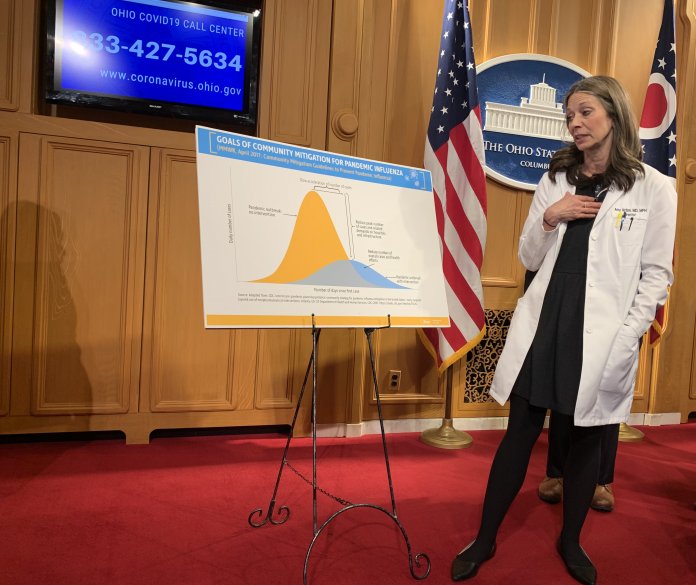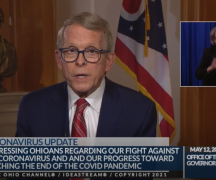Ohio Capital Journal
Two Republican state lawmakers are proposing new legislation that would strip the state’s health director position of much of its power to respond to a pandemic.
The bill is being proposed by state Reps. Ron Hood of Ashville and Reggie Stoltzfus of Minerva. The two sent a cosponsor request to colleagues in the Ohio House, a copy of which was obtained by the Capital Journal.
The Ohio Revised Code gives the Ohio Department of Health director wide authority in responding to a pandemic. Over the past few months, the current director, Dr. Amy Acton, has cited the code in issuing stay-at-home orders, business shutdowns and a last-minute closure of primary polling locations.
Hood and Stoltzfus claim the code “unconstitutionally confers ‘ultimate authority’ to a single executive officer … without limitations.”
Their bill would alter the health director’s authority in several ways:
- It would prohibit the director from issuing a “mandatory quarantine or isolation of people not exposed or medically diagnosed with the epidemic or pandemic disease”;
- It would require “appropriate legislative oversight” of the director’s orders, a similar proposal to the one passed by House members last week, and limit any order’s “effective time” to 30 days;
- It would prohibit the “closure of business property,” which the lawmakers describe as being a “seizure of property.”
The bill also would prohibit any entity besides the state legislature from postponing an election and prohibit testing “without the informed consent of the person tested.”

“This COVID-19 experience is the only time in our nation’s history (dealing with an epidemic) that healthy people have been quarantined or isolated,” the lawmakers wrote.
Hood and Stoltzfus want to outlaw making people stay at home if they are “not exposed or medically diagnosed” with a disease. Acton and other health officials have defended the across-the-board order because of the threat of “community spread.”
It is difficult to know exactly who has been exposed to the disease, because some people are asymptomatic and COVID-19 has a lengthy incubation period. Some people do not begin experiencing symptoms until many days after they are exposed.
Both Hood and Stoltzfus have been critical of the Ohio government’s response to the COVID-19 pandemic. They both voted for an amended Senate Bill 1 this past week, which calls for giving a group of legislators the chance to put any health order from Acton to a vote.

Stoltzfus was among the signers in late April of a “Responsible Open Ohio Framework,” a plan from 35 Republicans in the Ohio House of Representatives which sought to get Ohio immediately reopened without any mandatory safety measures. Stoltzfus has also characterizedActon’s orders as threatening Ohioans’ liberties.
Hood represents the 78th House District, which includes all or parts of six counties in Southeast Ohio. He is serving his fourth term in the Ohio House and is term-limited from running for reelection. Stoltzfus represents the 50th House District, which includes the eastern portion of Stark County outside of Canton. He is serving his first term and is running for reelection this November.
Their bill is among several legislative attempts this month from Republicans to curb the power of the Ohio Department of Health and get the Ohio General Assembly more involved in the COVID-19 response.
Besides SB1, state Rep. John Becker, R-Union Twp., proposed his own bill that would reopen Ohio “without delay” and require orders to have legislative approval. State Reps. Jon Cross, R-Kenton, and Shane Wilkin, R-Lynchburg, have a new bill called the “Ohio Business Fairness Act” which would alter the state’s ability to keep some non-essential businesses closed during a pandemic.





